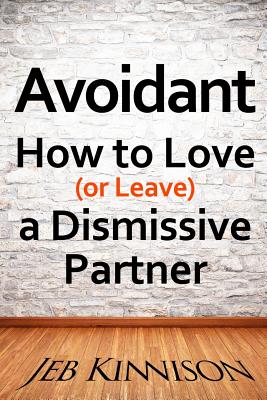Avoidant: How to Love (or Leave) a Dismissive Partner

Avoidant: How to Love (or Leave) a Dismissive Partner
Jeb Kinnison's previous book on finding a good partner by understanding attachment types (Bad Boyfriends: Using Attachment Theory to Avoid Mr. (or Ms.) Wrong and Make You a Better Partner) brought lots of readers to JebKinnison.com, where the most asked-about topic was how to deal with avoidant lovers and spouses. There are many readers in troubled marriages now who are looking for help, as well as people already invested in a relationship short of marriage who'd like help deciding if they should stick with it. People in relationships with Avoidants struggle with their lack of responsiveness and inability to tolerate real intimacy. Relationships between an Avoidant and a partner of another attachment type are the largest group of unhappy relationships, and people who love their partners and who may have started families and had children with an Avoidant will work very hard to try to make their relationships work better, out of love for their partner and children as well as their own happiness. The Avoidants in these relationships are more than likely unhappy with the situation as well-retreating into their shells and feeling harassed for being asked to respond with positive feeling when they have little to give. The other reason why so many people are looking for help on this topic is that it is an almost impossible problem. Couples counsellors rarely have the time or knowledge to work with an Avoidant and will often advise the spouse to give up on a Dismissive, especially, whose lack of responsiveness looks like cruelty or contempt (and sometimes it is ) Yet there is some hope-though it may take years and require educating the Avoidant on the patterns of good couples communication, if both partners want to change their patterns toward more secure and satisfying models, it can be done. How can you tell if your partner is avoidant? Does your partner: -Seem not to care how you feel? -Frequently fail to respond to direct questions or text messages? -Accuse you of being too needy or codependent? -Talk of some past lover as ideal and compare you to them? -Act coldly toward your children and the needy? -Remind you that he or she would be fine without you? -Withhold sex or affection as punishment? If that sounds familiar, then your partner is likely avoidant. At about 25% of the population, Avoidants have shorter, more troubled relationships, and tend to divorce more frequently and divorce again if remarried. What can be done? Individual therapy for the motiv
PRP: 131.36 Lei
Acesta este Prețul Recomandat de Producător. Prețul de vânzare al produsului este afișat mai jos.
105.09Lei
105.09Lei
131.36 LeiLivrare in 2-4 saptamani
Descrierea produsului
Jeb Kinnison's previous book on finding a good partner by understanding attachment types (Bad Boyfriends: Using Attachment Theory to Avoid Mr. (or Ms.) Wrong and Make You a Better Partner) brought lots of readers to JebKinnison.com, where the most asked-about topic was how to deal with avoidant lovers and spouses. There are many readers in troubled marriages now who are looking for help, as well as people already invested in a relationship short of marriage who'd like help deciding if they should stick with it. People in relationships with Avoidants struggle with their lack of responsiveness and inability to tolerate real intimacy. Relationships between an Avoidant and a partner of another attachment type are the largest group of unhappy relationships, and people who love their partners and who may have started families and had children with an Avoidant will work very hard to try to make their relationships work better, out of love for their partner and children as well as their own happiness. The Avoidants in these relationships are more than likely unhappy with the situation as well-retreating into their shells and feeling harassed for being asked to respond with positive feeling when they have little to give. The other reason why so many people are looking for help on this topic is that it is an almost impossible problem. Couples counsellors rarely have the time or knowledge to work with an Avoidant and will often advise the spouse to give up on a Dismissive, especially, whose lack of responsiveness looks like cruelty or contempt (and sometimes it is ) Yet there is some hope-though it may take years and require educating the Avoidant on the patterns of good couples communication, if both partners want to change their patterns toward more secure and satisfying models, it can be done. How can you tell if your partner is avoidant? Does your partner: -Seem not to care how you feel? -Frequently fail to respond to direct questions or text messages? -Accuse you of being too needy or codependent? -Talk of some past lover as ideal and compare you to them? -Act coldly toward your children and the needy? -Remind you that he or she would be fine without you? -Withhold sex or affection as punishment? If that sounds familiar, then your partner is likely avoidant. At about 25% of the population, Avoidants have shorter, more troubled relationships, and tend to divorce more frequently and divorce again if remarried. What can be done? Individual therapy for the motiv
Detaliile produsului










